
Receiving (or not receiving) the Eucharist (Holy Communion) at Mass
| Saturday Vigil Mass |
5:00 PM, St. Paul |
| Sunday Mass | 7:30 AM, St. Mary 9:00 AM, St. Paul 11:30 AM, St. Mary |
| Daily Mass |
St. Mary St. Paul |
|
Traditional Latin Mass* |
St. Mary First Sunday of each month 9:00 AM |
*Provided by the Lancaster Latin Mass Community of St. Joseph’s (Lancaster, PA).
What is the Eucharist (Holy Communion)?
Whether visible during Mass or Eucharistic Adoration, or whether inside the tabernacle, the Eucharist (Holy Communion) is the Source and Summit of the Life and Mission of the Church. The Apostles and their successors consistently teach that it is the true, real, living and substantial presence of our Lord Jesus Christ—His Body, Blood, Soul and Divinity—understood by the Church to have become present through the transubstantiation of bread and wine (cf. CCC 1413 | More about the Eucharist | The Shocking Reality of the Eucharist).
Receiving (or not receiving) the Eucharist at Mass
All are welcome at Mass, yet not all should necessarily receive the Eucharist (Holy Communion) at every Mass.
Catholics—through the development of properly-formed consciences—are responsible for abstaining from Holy Communion if they know themselves to have committed mortal sin from which they have not yet been absolved (cf. CCC 1857- | Mortal vs. Venial Sin | Making a Good Confession). Catholics who are not certain about being in full communion with the Catholic Church should consult Father Art before presenting themselves for Holy Communion.
Non-Catholics should not present themselves for Holy Communion but may at that time instead present themselves for a blessing (signaled by crossing one’s arms, placing the palm of each hand on the opposite-side shoulder). This apparently inhospitable restriction is intended to respect the non-belief of non-Catholics (cf. What is the Eucharist? | Explanation by Bishop Robert Barron).